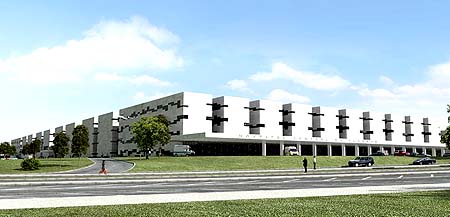In the year in which 40 years have passed since the Hospital de Faro and it marks the 40th anniversary of the National Health Service, the opportunity to build a new Hospital in the Algarve is once again discussed.
In these circumstances, I decided to take a stand in view of the responsibilities I assumed, between 2005 and 2011, as President of the Regional Health Administration of the Algarve, a period in which the region took relevant, but unfortunately inconclusive steps towards the construction of the New Hospital in the Algarve , an end-of-the-line hospital, with a care profile with a high degree of differentiation in response to the health needs of the resident population and those who visit us.
That said, it is important to remember that the current Hospital of Faro, designed in the second half of the 60s, had a troubled path, until the beginning of its operation, at the end of 1978.
Born in a period of transition (1972, the year in which the 1st construction phase was awarded to the Luso-Switzerland construction company) between a closed, strongly centralized and authoritarian society, with health indicators far removed from those in the rest of Europe, with scarce human resources heavily concentrated in Lisbon, Porto and Coimbra, and with an expenditure on health that was half that spent by the rest of Europe, and a society in which the State, through the Constitution of the Republic (1976), guaranteed the right to health and the universality of health care.
The new Hospital was born in a peripheral region, little industrialized, taking its first steps in the development of tourism, and exhausted by emigration, counting, in the 70s, with just over 250.000 people.
It grew up in the midst of difficulties, social, political and governmental instability, without the necessary monitoring by the government, without the logistical, financial and human resources adequate to the new times and what should be its role in the present and in the future. The hospital, never opened, is opening little by little, thanks to the commitment of those who were here, who, with affection, gave it the best they knew and could, improving it, adapting it to a non-projected reality, endowing it with skills before not planned.
Over the years, it has asserted itself, overcoming difficulties that affected its credibility, its image and its self-confidence in the first 10 years of operation, such as the death of the young Iria and the Joaquim Agostinho case. These events, by no means similar, were to be overcome by the high degree of competence and professionalism that its professionals demonstrated over the years and which would culminate in the exemplary response given by the Hospital in December 1992 [air accident at the Airport of Faro].
From that moment until the middle of the first decade of the 2008st century, the Hospital overcame constraints, improved its facilities, gained skills and saw its classification as a Central Hospital for funding purposes, funding that only arrived in XNUMX.
It is clear that the Algarve needs a highly differentiated, modern, end-of-line New Hospital that meets all the needs of the resident population and a highly touristic region, as recognized by the Government of the Republic since 2002, when it decided to move forward with the first studies for its construction, with the choice of the location for the building (2003), with its placement in the list of priorities for the construction of second wave hospitals (2006), with the new Hospital do Algarve ranked in the 2nd priority , immediately below the new Hospital de Todos-os-Santos, in Lisbon.

Once the priority had been established, it was necessary to study the design and profile of the New Hospital, prepare the Functional Program and put its construction into competition. This competition, launched in April 2008, always took place within the legal deadlines, and in January 2011 the final competitor, Teixeira Duarte, SA, was chosen.
On the date of entry into force of the Memorandum of Understanding between Portugal and the Troika, the final negotiation phase for the presentation of the BAFO “best and final offer” took place. In this context, marked by the economic and social crisis and the application of the Memorandum of Understanding, the conditions for the award of the work were not created, which has been postponed until today, due to financial unavailability.
In recent years, given the country's budgetary difficulties, the Novo Hospital do Algarve project has faded from the national political agenda, with the complacency of political and social agents in the Algarve, here and there contested by some more restless voices, placed in second plan, over the last two legislatures, sometimes because it was not a priority, sometimes because it was overtaken by other priorities (Évora and Seixal), without a transparent knowledge of the reasons that led to its secondary status.
Now, 7 years after the interruption of the award process and 10 years after the approval of its functional program, it will be necessary to reformulate some of its premises, taking into account the current and future characteristics of the population, demographic aging and the profile of health care activity developed over the last 10 years by the Hospital de Faro and its projection for the future, the integration of the New Hospital into the now Centro Hospitalar Universitário do Algarve, the creation of a radiotherapy unit contracted as the NHS or the 529 inpatient beds available in the regional continuous care network, in 2019, non-existent in when planning.
But now, more than ever, the Algarve and the country need a New Central Hospital.
The Algarve University Hospital Center and the Algarve Academic Research and Biomedical Training Center – Algarve Biomedical Center were created, as a result of the consortium between the Algarve University Hospital Center and the University of Algarve, in 2016, consolidated the integrated Masters in Medicine, which this year celebrates 10 years of existence, the University of Algarve, the Novo Hospital do Algarve will assume a relevant role in the economic and social development of the region and the country, it will be a pole of attraction for highly qualified professionals and an engine for the development of research and teaching at the University of Algarve.
In this year of 2019, which celebrates 40 years of the NHS, the Hospital of Faro and the University of the Algarve, the Region needs to put the construction of the New Hospital back on the country's political agenda, for the benefit of people who are born or choose the Algarve to live, work and visit, for the benefit of the country, we need the forces political and social unite around this structuring project for the region, leaving aside small interests and installed calculation.
Author Rui Lourenço
MD from Universidade Nova de Lisboa
Specialist in General and Family Medicine
Senior Graduate Assistant
Guest lecturer at the UAlg School of Health and Medicine Department
He was president of the Regional Health Administration of the Algarve between 2005 and 2011



















Comments